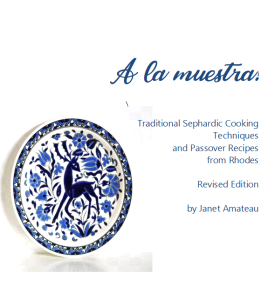Is it really Sephardic? Is it Sephardic enough?
Ethnic food is born and evolves out of common cultural experience and worldview. There’s no law against creating your own modern Sephardic recipes and no need to think you can’t do a riff on someone else’s version of a traditional one, either. We can be become so obsessed with preserving our culture that we tend to deny ourselves permission to experiment, or to accept someone else’s interpretation of something as valid, even if they’re from within the same culture. This holds true for any people (but probably with a higher level of anxiety when they’re propagandized as being extinct!). But it’s openness and experimentation that keep all cultures alive and interesting, and that can also get things back on track if they’ve lost their connection to a basic principle. If you do lose touch with the fundamentals of your own culinary heritage, if you start using too many shortcuts and too many substitutions, you deviate so far from your roots that you’re left not so much with a pale imitation of the real article as with something virtually unrecognizable.
There is no single, original author of the vast compendium of Sephardic recipes, nor of the Sephardic foods of any given country. Indeed, much of our food is traditionally prepared by groups of people working together – extended families and even whole communities – so it’s natural for many, many variations of the same recipe to have come into being, be they good, bad or indifferent (To quote my dad, “Nobody burns the roast like Momma!”).
We live in an age when it’s possible to find close by pretty much any ingredient you might need – if not at your local supermarket, then at a specialty shop or via mail order (including, as we now have learned, Persian ice cream). We’re so used to this level of convenience that it’s hard to imagine a time when preparing foreign foods with any degree of authenticity was nearly impossible if you moved to a new neighborhood, let alone a new country. If you wanted to continue to enjoy food as you knew it, you had to find substitute ingredients. Spices aren’t that difficult; they’re easy to transport. But think of something like cheese. I can’t get ricotta cheese where I live, so instead I use a cheese called mato’ – same flavor, different texture. I lived in Spain for a year before I finally found the one store that sells cottage cheese. Kashkaval? One tiny shop an hour away. Cuts of meat are radically different, as are the flavor and texture. The only dried legumes regularly available to me here are beans, beans, lentils, beans, garbanzos and more beans. The only place I can find barley – barley! – is at the local health food store. Dried peas? Forget about it. Ditto vanilla extract. When friends visit from abroad, they bring me bottles of my favorite brand. And there are many dishes I just don’t make any more because there are no appropriate substitutions, period.
Is there a flavor you remember that you want to recreate? Are you bored out of your skull with the dozen or so Sephardic recipes you’ve made forever? If you’re from a strong Sephardic tradition, then chances are pretty good you know by heart a set of flavors derived from a specific set of ingredients and cooking techniques. Turkish? Persian? Greek? Moroccan? Macedonian? You know where your family came from and what you remember, and that means you know what is within the realm of the authentic, if not strictly traditional. It’s in your gut.
Allow yourself the freedom to experiment within the realm of what you do recall, or what you can learn from authentic sources. If a ‘Sephardic’ recipe calls for, I don’t know, ketchup, let good sense prevail and give it a pass. I would no sooner use ketchup in a Rhodesli meatloaf than I would soak the bread in milk. But if I prefer how it turns out when I use two eggs instead of one, no problem. Leeks instead of onion? Why not – plenty of leeks in Rhodesli food. If I like my reshas more crisp than doughy, then I’ll adjust the ratio of flour to oil. And whenever I get something just right, I write it down immediately. You should, too. It’s way too easy to forget a triumph, and just as easy to repeat a dud. Don’t worry if your proportions are exactly the same as someone else’s. Noboday says they have to be. If you like your final result, that’s what counts – and who’s to say your version isn’t superior?
Recipes are like sheet music, just a basic melody on a page and subject to your personal interpretation. You’re the artist. Let your instincts, memory and good taste guide you. And have fun!


